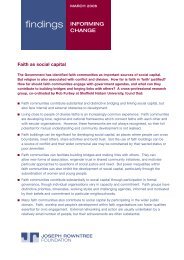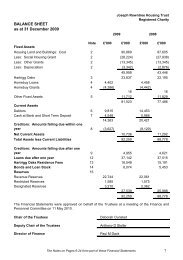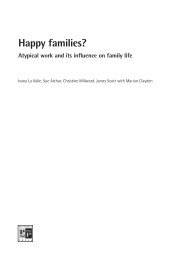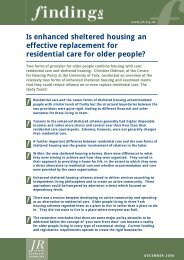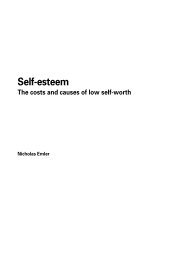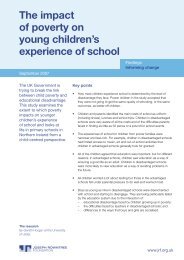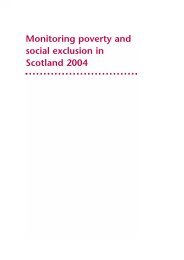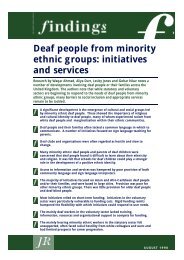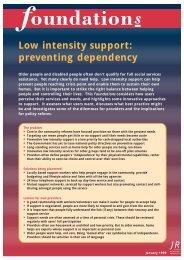Community participation - Joseph Rowntree Foundation
Community participation - Joseph Rowntree Foundation
Community participation - Joseph Rowntree Foundation
Create successful ePaper yourself
Turn your PDF publications into a flip-book with our unique Google optimized e-Paper software.
Understanding the links between <strong>participation</strong> in governance …<br />
more likely to engage in various forms of civic <strong>participation</strong> than those in<br />
disadvantaged areas, just as those in higher managerial and professional<br />
occupations are more likely to than those in routine occupations. 21 However, this<br />
measure includes anyone who has been engaged in some form of civic <strong>participation</strong><br />
in the previous 12 months. Focusing on the most active – the people who have been<br />
engaged in some form of civic <strong>participation</strong> at least once a month in the previous<br />
year – the Survey finds that those living in the most deprived areas are actually more<br />
active than those living in the least deprived areas. 22<br />
Others suggest that income itself is unimportant; the key factor is that the better-off<br />
have greater resources and skills to support higher levels of <strong>participation</strong>, which can<br />
be ‘mobilised’ around particular issues. 23 While we might accept that it is the latter<br />
that is most crucial, others suggest that:<br />
Everything that disadvantages people in the first place will prevent them<br />
from developing social networks or participating in collective activities:<br />
lack of money, poor transport, lack of childcare, an unsafe or depressing<br />
environment and the daily grind of having to manage on very limited<br />
financial resources. 24<br />
Of course, there are some highly deprived areas with high levels of <strong>participation</strong>, and<br />
some affluent areas with lower <strong>participation</strong>. 25 There is also evidence that the level of<br />
civic engagement among disadvantaged communities is underestimated because<br />
they prefer less formal forms of <strong>participation</strong>, shying away from involvement in<br />
committee-like organisations and structure in favour of more informal activities. 26 But<br />
this reinforces the earlier point – if surveys miss this informal layer of <strong>participation</strong>,<br />
it’s just as likely that formal governance is disconnected from it too.<br />
Marginalised groups<br />
Black and minority ethnic groups and disabled people are under-represented, inter<br />
alia, when it comes to voting in elections, among local councillors, in school<br />
governance, in further education college boards and among the trustees of voluntary<br />
and community organisations. 27 For many minority groups, campaigning for equal<br />
recognition is a much higher priority than engaging in governance activity itself. But<br />
these activities, despite the social links that emerge from them, tend to be perceived<br />
as lying outside the political mainstream at which they are most often directed. 28<br />
People rarely experience one of these excluding factors in isolation. Disabled<br />
people, for instance, are more likely to be in a lower socio-economic group than their<br />
able-bodied counterparts, and are also more likely to be unemployed. 29 The gap<br />
13



